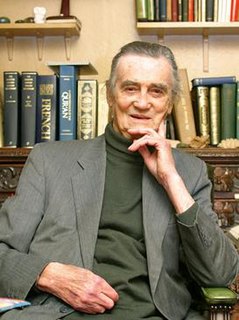A Quote by Catherine Stock
The muse on my shoulder is very sensitive and does not abide claptrap of any kind... Only when I am totally immersed... absorbed in work... does she allow something magical to happen and I become aware of a faint heartbeat and gentle breath emanating from my brush.
Related Quotes
I don't have any choice any more. I am in a choiceless awareness. I don't have to be aware. I am simply aware. Now it is just like my heartbeat or like my breathing. Even if I try not to be aware, it is not possible; the very effort will make me more aware. Awareness is not a quality, a characteristic; it is your whole being. When you become aware, there is no choice left to be otherwise.
The muse is not an angelic voice that sits on your shoulder and sings sweetly. The muse is the most annoying whine. The muse isn't hard to find, just hard to like - she follows you everywhere, tapping you on the shoulder, demanding that you stop doing whatever else you might be doing and pay attention to her.
I thought you said that after this many years nothing should embarrass him?" Leigh said with gentle amusement. Lucian grunted. "I guess he's more sensitive than I thought." "I am NOT sensitive," Cale snapped, irritated by the very suggestion. "It's probably his mother's fault," Lucian said, ignoring him. "Martine named him after Caliope, the muse of poetry. Between that and his father dying when he was only fifty, he's probably suffered under Martine's namby-pamby influence.
Like Woody Allen actually does this a lot in his movies, its kind of called magical realism where he has just kind of an everyday, these kind of everyday experiences and all the sudden something magical or supernatural will come into to and I just, I love that and I think everybody can kind of - everybody wants that at some point in their life.
The agnostic has a very curious notion of religion. He is convinced that a man who says 'I believe in God' should at once become perfect; if this does not happen, then the believer must be a fraud and a hypocrite. He thinks that adherence to a religion is the end of the road, whereas it is in fact only the beginning of a very long and sometimes very rough road. He looks for consistency in religious people, however aware he may be of inconsistencies in himself



































